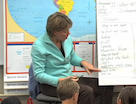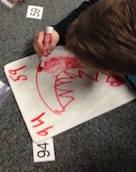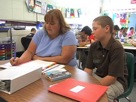Joan Moser
Have you ever had a conversation that resulted in a total change of course or shift in your thinking? I had one with a friend recently. Our conversation was about planning a path to my future. It wasn't a "what do I want to be when I grow up" kind of dialogue, but a conversation looking ahead to the next few months and year for the purpose of planning and goal setting.

I shared that on my near-future path, I don’t want to continue getting as little sleep as I am now, and I don’t want to worry about so many things I have no control over. As I made these statements, my friend interrupted and asked this simple, course-correcting question: “Joan, what do you want?” Pausing, I thought to myself, What do you mean? That is what I want.
She went on to remind me that as humans, we manifest what we say and think. By talking about my goals and hopes in terms of what I don’t want, it is more than likely these things will actually occur. (Gulp. More lack of sleep? More worry? No thank you!)
In that moment, with that simple question, my thinking shifted. The question pushed me to scrutinize my words and think about what I do want. I want to get more sleep. I want to invest time thinking about things I do have control over.
It’s the time of year educators around the globe are thinking of and planning the path for the future—the school year ahead. We are asking ourselves questions such as What do I want for my students this year? What do I want them to leave the classroom with at year’s end? How do I want to grow professionally? What do I want my classroom and school environment to look and feel like? If we truly want our plans, hopes, and dreams to manifest in our classrooms and schools, this is a wonderful time to consider what we want and to take my friend's advice.
She suggests saying aloud what it is we want. If we hear an expression of hopes and goals come out of our mouths in any way other than “I want . . . ” we need to alter our words. This simple language shift may result in a profound and positive course correction for our students, our schools, and ourselves, all with only a few words.
So, what is it you want this year?
News from The Daily CAFE
 Questions Answered . . .
Questions Answered . . .
Why don’t you have students brainstorm behaviors for the I-charts anymore?
Because we learn from our mistakes. Want to see?
 Purposeful Practice . . .
Purposeful Practice . . .
Personal Dry Erase Board Options*
There are many options for providing each student with a personal-sized, dry erase board. See if one of these will work for you.
 Assessment Matters . . .
Assessment Matters . . .
Using Spring Data to Set Fall Goals*
Students often know their own strengths, but when they are unsure, our conferring notes help us zero in on their targets.
 Try Today . . .
Try Today . . .
2015–2016 Calendars
If you are using a three-ring binder for your conferring notebook, you might want to download these calendars so you can easily keep track of appointments with students.
 Focus on Health . . .
Focus on Health . . .
Live Your Life with Play
Carol Moehrle reminds us that life is more enjoyable if we play.
*Available to members





